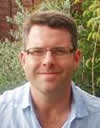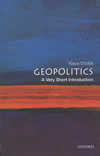Introducing
 Klaus Dodds (London, 1969) completed degrees in geography and political science before obtaining his PhD at the University of Bristol. He is currently Professor of Geopolitics at Royal Holloway, University of London. Professor Dodds is also editorial board member of several journals including “Geopolitics” and “Political Geography”.
Klaus Dodds (London, 1969) completed degrees in geography and political science before obtaining his PhD at the University of Bristol. He is currently Professor of Geopolitics at Royal Holloway, University of London. Professor Dodds is also editorial board member of several journals including “Geopolitics” and “Political Geography”.
He has also written five books about geopolitics, including “Geopolitics – A Very Short Introduction” and the recently published “Spaces of Security and Insecurity: Geographies of the War on Terror” (with Alan Ingram).
Geopolitical Passport
Your relationship with geopolitics
At what age did you discover geopolitics and what attracted you to it?
 When I was in my final year at school (17/18) and first began to read about this term ‘geopolitics’ and thought it was very exciting and interesting precisely because it addressed global questions and issues.
When I was in my final year at school (17/18) and first began to read about this term ‘geopolitics’ and thought it was very exciting and interesting precisely because it addressed global questions and issues.
As a teenager I grew up in politically exciting times – British politics was sharply divided between the political left and right and the Cold War was entering into an important transition phase – from Second Cold War to eventual ending in 1989.
Which geopolitical topics do you focus on and why have you chosen especially these?
My principal academic concern from doctoral research onwards has been critical geopolitics and more recently popular geopolitics. I was inspired by some of the earliest papers by Gerard Toal and Simon Dalby in the late 1980s and thought that was a really new and radically different approach to Anglophone geopolitics.
Regionally, I was lucky enough to be taught and supervised by Professor Les Hepple who inspired my interest in South America, the South Atlantic and Antarctica. It was he who introduced me to the extraordinarily rich literature on geopolitics in Spanish with particular reference to Argentina and Chile.
My doctoral research explored inter alia Anglo-Argentine geopolitical competition in the South Atlantic and Antarctic (e.g. Falkland Islands/Islas Malvinas).
What do you consider your most important contribution to geopolitics?
I hope I have made a contribution in three particular areas – first the development of critical geopolitics and popular geopolitics through my work on cartoons and films. I have also sought to move critical geopolitics into a more sustained concern with audiences.
Second, the history of geopolitics has been an area of concern – to better understand how this term has been debated and negotiated in the Anglophone and non-Anglophone worlds.
Third, in the specific area of the Polar Regions I hope I have shown how it is possible to consider the way in which contested territorial representations (and practices such as mapping) manifest themselves in popular and elite cultures.
My geopolitical preferences
What is your favourite definition of geopolitics?
I am not sure I have one to be honest. I tend to more concerned with the ways in which the term ‘geopolitics’ is understood and put into some sort of political and cultural practice.
Which geopolitical scientist do you admire the most?
I remain hugely indebted to my doctoral supervisor Les Hepple who showed me at least how it was possible to both scholarly but also collegial and one who took the notion of professional service seriously. Les died in 2007 and I still feel his loss greatly.
Apart from Les, I admire the energy and supportiveness of Simon Dalby at Carleton University. Simon has been consistently supportive of me and I greatly admire his work in environmental security and his contribution to critical geopolitics more generally.
What is your favourite geopolitical book?
I tend to admire journalists such as Robert Fisk and dissenting intellectuals such as Noam Chomsky and Edward Said who might not be considered ‘geopolitical’ in one sense but who on the other hand clearly write on topics that are of great interest to critical geopolitical scholars.
I admire and like Derek Gregory’s “Colonial Present” (Blackwell 2004), which combines scholarship with crispness of expression. It is also an angry and outraged book as well. I sometimes think my own writing does not convey well enough that sense of anger I also feel about persistent injustice and spatial inequalities.
The other person I really like reading is Cynthia Enloe and all her books are very thought provoking. She is a brilliant speaker as well.
What is your favourite geopolitical website?
Apart from this one of course, I like the website called Theory Talks (and I am not just saying that because I am included by the way!). (Editor’s note: see Theory Talks – interview with Klaus Dodds).
The geopolitical future
In what direction(s) will geopolitical science be heading the coming decades?
I think there are lots of potential directions. First, I think the turn towards other methodologies such as ethnography is interesting and welcome but I would also like to see geopolitical scholars engaging with GIS and quantitative methodologies. This is helping I think to produce more sophisticated accounts of the workings of geopolitical power for example.
Second, I would like to think that critical geopolitical writers and scholarship will engage with more public audiences and not be afraid to tackle public intellectuals such as the American, Robert Kagan. Engaging with what we might call neo-classical geopolitics remains essential.
Third, I would like to see geopolitics experiment more with different forms of writing, presentation and approaches such as counter-factualism.
Which geopolitical subject has been too little in the spotlight and needs further research?
I think there is still a great deal more to say about children and young people. I am really struck by how the literatures on children’s geographies and geopolitics do not speak to one another (with some exceptions).
I would like to see more research addressing peace and non-violence and an engagement with the literature on peace studies. These are just two examples.
What will be the largest geopolitical challenge for the world in the 21st century?
I think tackling global climate change and doing so in a way that fairly recognises imperial, Cold War and other legacies and inequalities.
